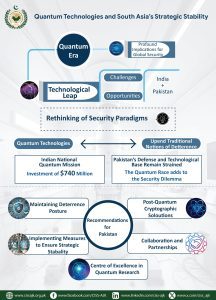 The quantum era is here, and its implications for global security are profound. For nuclear-armed neighbours like Pakistan and India, this technological leap poses challenges and opportunities that require a significant rethinking of security paradigms. Quantum computing, a transformative development in information technology, has the potential to revolutionise cryptography, military strategy, and national security.
The quantum era is here, and its implications for global security are profound. For nuclear-armed neighbours like Pakistan and India, this technological leap poses challenges and opportunities that require a significant rethinking of security paradigms. Quantum computing, a transformative development in information technology, has the potential to revolutionise cryptography, military strategy, and national security.
The Strategic Security Context
Quantum technologies threaten to upend traditional notions of deterrence. Encryption methods like RSA and Diffie-Hellman, which underpin nuclear command and control systems, rely on mathematical problems that are currently infeasible for classical computers to solve. However, quantum algorithms like Shor’s algorithm render these methods obsolete, exposing sensitive data to potential adversaries (Nature). Nations like the U.S. are already deploying Quantum Key Distribution (QKD) networks, offering theoretically unbreakable encryption (MIT Technology Review).
India’s National Quantum Mission, with an investment of $740 million, positions it to achieve substantial advancements in this field (The Diplomat). For Pakistan, whose defence budget and technological base are constrained, the quantum race adds to its already precarious security dilemma. Countering these advancements necessitates a focus on indigenous quantum research and cryptographic resilience.
Emerging Quantum Challenges
Quantum technologies extend beyond cryptography. Quantum sensors could detect submarines by measuring subtle variations in magnetic and gravitational fields, potentially undermining second-strike capabilities that are critical for nuclear deterrence (RAND Corporation). Similarly, quantum radars may render stealth technologies ineffective. Combined, these capabilities could disrupt the regional balance of power.
Recommendations for Pakistan
To maintain its deterrence posture, Pakistan must in quantum-resistant encryption, develop indigenous quantum technologies and explore multilateral collaboration. Transitioning to post-quantum cryptographic solutions is critical to safeguarding nuclear command, control and communication systems. If hostile countries and actors can wreak havoc in deterrence and operations if they break into NC3 systems.
Establishing a centre of excellence in quantum research can catalyse local innovation. This could be build on the lines of American DARPA. Pakistan’s NUST and its counterpart universities have basic knowledge base that can be conjoined with government’s patronage. A joint project can avoid frittering away meagre R&D funds. Government’s patronage may help overcome some inter-university turf competition.
Partnering with like-minded countries like China can help build a competitive edge. However, such cutting-edge technological cooperation may involve some give and take that Pakistan should be able to do for its long-term interests. By adapting to the quantum age, Pakistan can ensure strategic stability and avoid vulnerabilities in an increasingly asymmetric South Asia.
Author
Zahir Kazmi is Arms Control Advisor at the Strategic Plans Division

